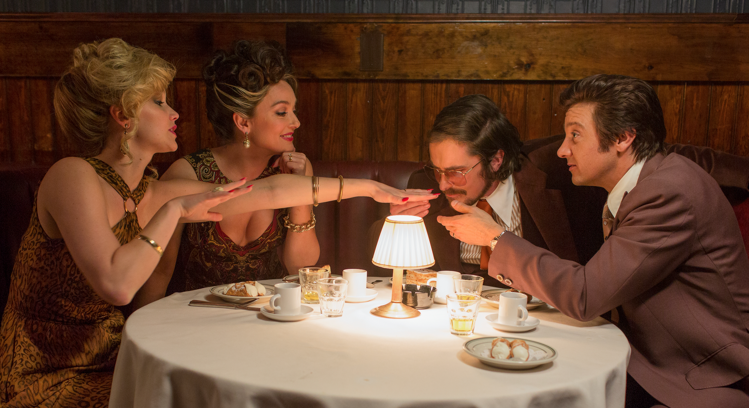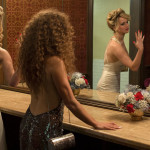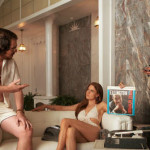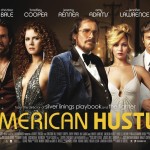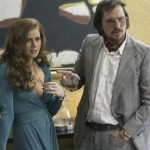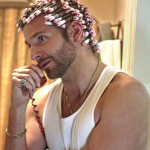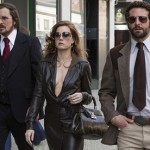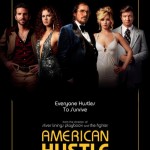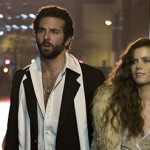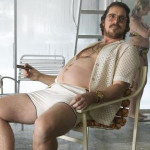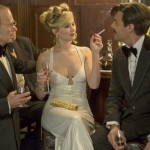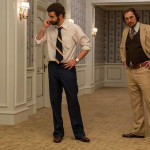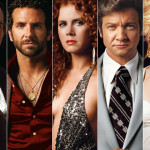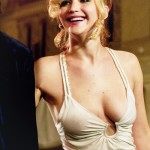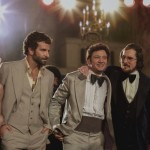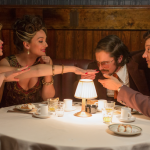In reviewing this jolly jaunt, I have to overcome two personal prejudices. One is that I shudder at the thought of anything glorifying they styles of the 70s. Yes, I was a teen in the that decade and there are movies and music I love, but the fashions, the decor, hair styles and everything else from that time makes my blood run cold – and films exploiting that style simply make me think of the formulaic American cop shows I used to loathe. Saying that will probably make me deeply unpopular with those whose memories are rosier-tinted than mine, but I’ll run that risk in my certainty that much of the 70s look was, to coin a phrase, pretty naff.
Secondly, I am not a fan of Amy Adams. It’s not that she doesn’t look nice, but I’ve yet to be convinced by her performances. Granted that being sandwiched on screen with two mega-talents like Streep and Hoffman in Doubt was always going to make her look insipid, though even where she is not overshadowed, as with Julie & Julia, she didn’t nail it. I appear to be flying in the face of popular opinion, given that Ms Adams has been multiply nominated for Oscars, BAFTAs and the like (see here), but American Hustle appears to be the breakthrough role which everyone agrees is her marker – of which more anon.
Putting aside my distaste for the 1970s pastiche element, this being at least in part a blackish comedy, I’d probably characterise David O Russell‘s American Hustle (70s movie made in 2013) as being a virtual update of the Sting (30s movie made in 1973) in that its main protagonists are small con merchants, grifters on the make, squeezed between the big league players, here the FBI, the mayor, congressmen and the mob – remembering that this is all loosely based on real facts, though not sufficiently close to make it a proper biopic.
At the centre of it all is a fat and bewigged Christian Bale as Irving Rosenfeld, sending himself up royally. This is a performance of which I approve, mostly because real life grifters are not invariably the beautiful people Hollywood typically portrays them to be. That said, he is married to a less feasibly beautiful woman, though instability and indiscretion seem to be Rosalyn’s prime traits (coming in the form of Jennifer Lawrence) and is apparently in love with a beautiful and worldly wise mistress and co-grifter (Sydney Prosser, aka Adams attired in a series of eye-poppingly low-cut dresses that owe much to double-sided sticky tape.) This makes you wonder what magnetic charm Bale’s Irving possesses, and which his women somehow fail to communicate. Not impossible, since power is the drug that entices more than skin-deep beauty.
Power? Well more the thrill of getting away with short cons and flogging counterfeit art. The essential problem is that the pair have been rumbled by FBI agent Richie DiMaso (Bradley Cooper), and forced to play cons on his behalf as he attempts to catch the big fish – and they come no bigger than earnest Democrat mayor Carmine Pollito (Jeremy Renner) and, best of all, mobster Victor Tellegio, the right hand man to Meyer Lansky – and in movies they come no bigger than Bob De Niro, who in this guise is speaking Arabic rather than Italian. DiMaso’s problem is that his boss (the anally retentive Stoddard Thorson) is less than wildly enthusiastic about the scheme, though top banana Anthony Amado appears to be hooked.
There you have all the ingredients for a saucy caper in which everything goes wrong but somehow turns out OK. And so the caper goes to the final turning of the tables. Russell’s narrative holds our attention, though “gripped” would be over-egging the pudding. Some of the dialogue is improvised to help things fizz, but the underlying story is pretty familiar. Maybe I’ve seen too many movies of this genre not to know how it is going to end, though many would find that formula appealing, and one which takes an unexpected direction less desirable? No doubt whatever that it’s done well though the acclaim seems, to my eyes at least, somewhat over the top:
American Hustle received critical acclaim upon its release. The cast received praise for their performances, notably Jennifer Lawrence and Amy Adams. Review aggregation website Rotten Tomatoes gives the film a 93% rating, based on reviews from 243 critics with an average score of 8.2/10. The site’s consensus reads, “Riotously funny and impeccably cast, American Hustle compensates for its flaws with unbridled energy and some of David O. Russell’s most irrepressibly vibrant direction.” Metacritic gives a score of 90/100, indicating “universal acclaim”, based on reviews from 47 critics.
Christy Lemire awarded the film four out of four stars, praising David O. Russell’s directing and the relationship between Irving and Sydney, as well as Jennifer Lawrence’s portrayal of Rosalyn. She writes: “For all its brashness and big personality, American Hustle is a character study at its core—an exploration of dissatisfaction and drive, and the lengths to which we’re willing to go for that elusive thing known as a better life.” Richard Roeper of the Chicago Sun-Times gave the film an A+, especially complimenting Bradley Cooper’s performance and stating that American Hustle was “the best time I’ve had at the movies all year.” He later named it the year’s best film. Time magazine’s Richard Corliss wrote, “American Hustle is an urban eruption of flat-out fun — the sharpest, most exhilarating comedy in years. Anyone who says otherwise must be conning you.”
Peter Debruge of Variety was critical of the film, calling it “a sloppy sprawl of a movie” and complaining that the improvisational performances overwhelm instead of adding to a coherent plot.” He also went on to write that it “makes your brain hurt — and worse, overwhelms the already overcomplicated Abscam retelling at the center of the film.”
Yes, this is moderately entertaining stuff. Where I agree most with the critics is that American Hustle is at its core a character study, and by those characters it lives or dies. Most are painted with painstaking care, though in their unpredictable way are very predictable in behaviour and language, not as three dimensional as they hope to achieve.
Let’s credit Adams though – she performs with greater edge and urgency than I’ve ever seen her before, thus demonstrating that my assessment of her capabilities needs substantial revision. However, Lawrence wins the battle of the actresses by a short head. I like the air of a woman scorned, and the fact that she is the only truly loose cannon to be seen helps her stand out; in fact it gives her plausibility you might not otherwise suspect of a character that could in some hands have been a drab and lifeless cliché.
Yes, I like AH, but with nothing like the gay abandon with which some have praised it. In the Oscar race it missed out totally in spite of a hatful of nominations. You can see an analysis of why here, though to my mind the missing spark is one of originality. Is this really saying anything The Sting did not?

